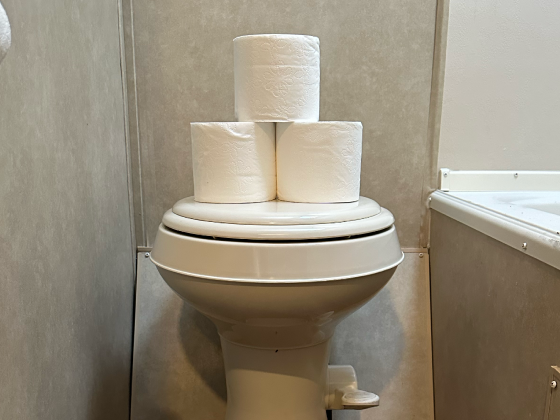As an Amazon Associate, Unique Camping + Marine earns from qualifying purchases.
Key Points:
- There are three types of antifreeze: Ethanol, Propylene Glycol, Ethylene Glycol
- Only propylene glycol RV antifreeze is safe to use with Unique products; all other types will kill the good bacteria present in Unique RV Digest-It Plus.
- It’s safe to dump RV antifreeze (ethanol and propylene glycol) as you would normally at a dump station or home cleanout but you can also take the used antifreeze to an auto parts shop or mechanic shop for extra safe disposal.
- High levels of RV antifreeze can still cause harm to humans, animals, and the environment itself, and all types of antifreeze are flammable, so be cautious.
- Look for products made with “virgin” or fresh ingredients for the best results.
- There are two ways you might use RV antifreeze in your camper: to winterize for sitting idle through the winter (add to all tanks) or while in use (only add it to gray and black tanks).
We all know antifreeze is very important in your car, in both freezing and high heat environments, but do you really need it in your RV holding tanks? The answer is, yes, especially if you are winterizing your RV. Antifreeze will help stop any residual water from freezing in your lines and tanks while it’s sitting idle through the winter, but you can also use it while camping in colder climates when the outside temperatures may dip to below freezing. However, you can’t use just any antifreeze in your RV, and even among the antifreeze products specifically made for RVs, you still need to weigh certain risks. In this article, we will walk you through the definition of antifreeze and the differences between the various types, when to use antifreeze, and choosing brands that use the best ingredients.
What is antifreeze?
Antifreeze is a blend of chemicals that slows the amount of time it takes for water to expand in sub-freezing temperatures by lowering the freezing point. All types of antifreeze are essentially a form of alcohol, which is what extends the freezing point of water. Antifreeze is typically made up of three different chemical components:
- Ethanol
- Propylene Glycol
- Ethylene Glycol
Ethanol Antifreeze
This type of antifreeze is considered safe for use in RVs, but the level of ethanol concentration makes it a poor choice with Unique products as the amount of ethanol will kill the good bacteria that breaks down the waste. It also drys out rubber seals faster than they naturally would from typical wear and tear, so check the condition of your seals before using this type of antifreeze; seals in good condition should stand up just fine to ethanol antifreeze, but more weathered and brittle seals could be pushed over the edge of effectiveness if you start using ethanol antifreeze regularly.
Propylene Glycol Antifreeze
Antifreeze that is created with propylene glycol is the safest option for your camper. When referring to RV antifreeze, it usually means antifreeze made with propylene glycol, and we recommend using this type of RV antifreeze with Unique products because the levels of propylene glycol are not enough to kill the bacteria and it is much safer to handle. However, the levels of propylene glycol in antifreeze are low enough that at some point (maybe a few days depending on the level of tank usage) the bacteria will feed on it and consume it. As long as you keep adding antifreeze to your wastewater tanks in regular intervals, it’s unlikely any freezing issues will arise.
Ethylene Glycol Antifreeze
Ethylene glycol is a very toxic component that is not safe for RVs. Typically, this chemical is seen in automotive antifreeze, and it should only be used in automobiles, not the holding tanks of recreational vehicles. It is highly toxic to ingest, inhale, and can cause damage if spilled on the skin, so any time you need to use this product, use extreme caution.
Automotive antifreeze (ethylene glycol) and RV antifreeze (ethanol and propylene glycol) are very different and should not be used interchangeably. Automotive antifreeze is toxic and is designed for hearty engines, not plastic holding tanks. RV antifreeze is specifically designed to pose little risk of damage to RV holding tanks. However, remember that ethanol-based RV antifreeze has the potential to dry out rubber seals, whereas propylene glycol actually lubricates seals.
Is RV antifreeze safe to dump?
As we discussed above, there are different chemicals that could make up antifreeze, and each combination has a different level of toxicity for humans and the environment. Car antifreeze (ethylene glycol) should never be used in an RV holding tank and should never be carelessly dumped down a drain or into the environment. There are no EPA regulations on disposing of antifreeze, but many service stations or auto parts shops provide a disposal service; there may also be recycling centers in your area that dispose of antifreeze and other chemicals. Also keep in mind that all types of antifreeze are combustible, so use caution when storing it, making sure nothing is near that could ignite it.
Propylene glycol antifreeze and ethanol antifreeze are both okay to dump at a dump station or down your home cleanout port. There are many forums and articles out there that will tell you that you should bring your used RV antifreeze to a recycling center every time, but the the levels of propylene glycol in the RV antifreeze are so low that once it gets to the sewage treatment plant, it will be easily taken care of by the treatment process. Even the ethanol-based antifreeze will be so diluted by the amount of bacteria and liquid at the treatment plant that it will not pose a threat to the health of the bacterial colonies there. Of course, if you want to be as safe as possible and dispose of RV antifreeze like you would automotive antifreeze, go ahead and do it! Even though these two types of RV antifreeze are not as toxic as automotive antifreeze, no kind of antifreeze should be dumped on the ground as it could cause damage to the plant life and attract critters.
Is RV antifreeze safe to drink?
Antifreeze in general has a sweet taste and smell, which can easily attract many types of animals to partake, but ingesting it will almost certainly kill any animal that laps it up. Ingesting ethylene glycol at any level is dangerous to both humans and animals, but high levels can lead to swift renal issues and death if left untreated. Propylene glycol antifreeze can lead to serious problems in humans if enough is ingested; smaller amounts can be easily dealt with, but propylene glycol can still cause serious problems in any animal that ingests it. It’s best to treat all types of antifreeze as toxic and avoid ingestion, inhalation, and contact with skin altogether, so be sure it is stored somewhere safe away from the reach of pets and children.
Are all brands of RV antifreeze the same?
Be careful when choosing RV antifreeze brands because some manufacturers may use recycled products to manufacture the antifreeze, which could cause the product to be less effective. Used antifreeze can sometimes be collected and recycled for a second use or for use in a new product, but the danger here is that contaminants could be present in the recycled product. Ideally you want to buy RV antifreeze products, whether it’s ethanol-based or propylene glycol-based, that are “virgin” or made from fresh components. However, if you do not have access to products made with virgin ingredients, you’ll still receive benefits from using products with recycled ingredients. It’s unlikely that tainted antifreeze products will cause damage to your tanks; it just may be slightly less effective than antifreeze made with virgin ingredients.
When should I use RV antifreeze in my RV?
Any time there is a danger of freezing temperatures is when you want to use antifreeze in your tanks, but how you use it depends on how you are using your RV.
Using Antifreeze to Winterize
Most people winterize their RVs when colder weather is on the way because they do not intend to use them during the cold winter months. In this case, camper antifreeze should spread across all tanks (including the freshwater tank) and all water lines as a part of the winterization process. This will ensure that any residual water that was not blown out of the lines will not freeze and cause damage. We have a guide on this process that will walk you through exactly how to spread the antifreeze through all of your tanks and lines.
Guide: How to Winterize Your RV
Applying Camper Antifreeze While Using the RV
While most people don’t intend on using their RVs in freezing temperatures, there are others who love the thrill of a winter camping adventure. There are lots of ways to prevent freezing in your tanks and lines while in use, and one of those ways is to use antifreeze in your black and gray tanks. This is an especially good option if your budget cannot handle purchasing an expensive heater for your tanks or skirting for the bottom of the RV.
Note: We do not recommend putting RV antifreeze in your freshwater tank while in use. If your freshwater tank is exposed to freezing temperatures, the best route is to install a heating blanket.
Putting RV antifreeze into your black and gray tanks will lower the risk of freezing, but water lines could still be in danger of freezing without some kind of insulation or heating element, so be sure to review our guide on preventing freezing in your tanks and pipes.
Guide: How to Keep Your RV Holding Tanks from Freezing
Review
We want to reiterate one more time that consuming antifreeze of any kind in large quantities can be lethal to any living organism, so use caution when handling and storing all types of antifreeze. We’ve thrown a lot of information at you about antifreeze, so here’s a brief review of what we discussed:
- There are three types of antifreeze:
- Ethanol - RV safe but it will kill the good bacteria and can dry out rubber seals
- Propylene Glycol - RV safe and will not harm the good bacteria, but eventually the bacteria will consume it
- Ethylene Glycol - NOT RV safe as it is highly toxic and designed for high heat, robust environments like car engines
- It’s safe to dump propylene glycol antifreeze and ethanol antifreeze in dump stations and down your home cleanout port, but if you want to be super safe, take the used antifreeze to an auto parts shop or mechanic shop for disposal.
- High levels of any antifreeze can cause harm to humans, animals, and the environment itself, so never dump antifreeze on the ground and keep it stored away from the reach of children.
- All types of antifreeze are flammable, so keep it stored somewhere well away from ignition sources.
- Some manufacturers use recycled chemicals to make new products, which can sometimes include contaminants that could make the final product less effective; look for products made with “virgin” ingredients for the best results.
- There are two ways you might use RV antifreeze in your camper:
- To winterize - in this case, you spread the antifreeze through every pipe and every tank (including the freshwater tank) and leave it all winter.
- While in use - when using antifreeze while the RV is in use, you should only add antifreeze to the black and gray tanks (never add it to the freshwater tank while in use) and you’ll likely need to keep adding antifreeze to maintain effectiveness.

Prevent Common Problems In Your Tanks!
From misreading sensors, preventing clogs, or eliminating odors, we've got you covered no matter how you camp! All our best holding tank tips and trick information plus more can be found conveniently in one place when you download our FREE Unique Method Field Guide. Achieve holding tank bliss today!
Get The Free Download



